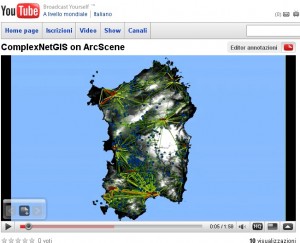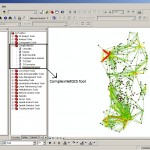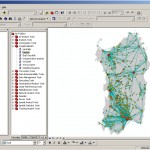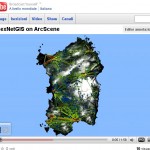ComplexNetGIS
-
The tool has now a web site.
Visit : www.complexnetgis.com
ComplexNetGIS is an ArcGIS Arctoolbox for the visualisation and analysis of networks in a spatial domain. It was developed using Python programming language together with the use of the network library NetworkX.
The tool was built with the aim to read existing network data without having to redraw them in ArcGIS and to implement a network analysis inside ArcGIS without using third part software.
- Click to enlarge the figure of ComplexNetGIS tool
- Click to enlarge the figure about Degree component
- At the bottom of the page a link to a youtube movie about a 3D view in ArcScene
ComplexNetGIS is composed of the following components:
– TXTconverter and TXT2SHP for the visualisation of a network (starting from a text data network)
– Shp2TextFile reads a polyline shapefile and build the network structure
– Degree implements a degree analysis (number of connections for each node) and a clustering analysis (level of connection between first neighbors of each node)
– Centrality: measures the level of centrality of each node through two network indexes: degree centrality (for a whatsoever node v is the fraction of nodes it is connected to) and betweenneess centrality (number of shortest path passing through each node)
– Page Rank: <under construction>
– Weighted analysis takes into account the strength of each link by developing a measure of the stregth of each node (sum of weights of the links departing from each node) and the disparity Y2
– Transport analysis develops a number of transportation indexes: Average of Detour Link Indeces, Average Network Detour Index, Topological Diameter, Spatial Diameter, Number of cycles, Max degree, Average degree, Min degree, Alpha index, Beta index, Gamma index, Eta index, Theta index , Topological Pi index, Spatial Pi index (for a review of these indexes check out the web page http://people.hofstra.edu/geotrans/eng/ch1en/meth1en/ch1m3en_2ed.html )
– Cluster analysis: <under contruction>

- Click to watch a youtube video about a 3D view in ArcScene
-
Author: Simone Caschili (University of Cagliari – Department of Land Engineering)


